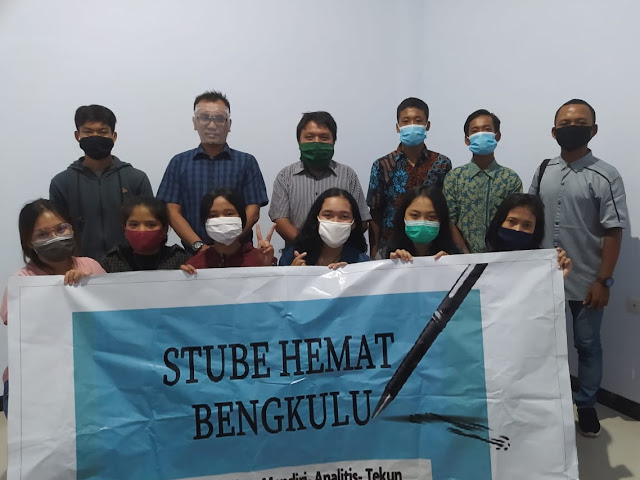Stube HEMAT Bengkulu enter the program on Multicultural and Interfaith Dialogue in July - September 2020. The programs series will be done by implementing health protocols (washing hands, wearing masks, distancing). Participants who are not healthy enough are suggested to have rest and to join the next meeting. The multicultural program entitled ‘Believe and be better’ took place in Bengkulu City during August 2020.
On August 22, 2020, Stube-HEMAT Bengkulu held a two sessions discussion. The first session was hosted by Hendra P. Luat Sihombing, a young man, an activist of Catholic Youth organization in Bengkulu. The second session was facilitated by Arnold Hok, an activist of Youth Organization of Vihara Buddhayana (AMVB) Bengkulu city. The first session was held at 10.00 WIB at Adeeva hotel and the meeting itself are limited to 10 participants regarding to the regulation of crowd limits set by the government during the pandemic. Six Bengkulu University students and four church youths attended this discussion.
Hendra
P. L. Sihombing said that in Bengkulu city there are around 6.000 Catholics.
Protestants have about 13.000 inhabitants. This number is around 1,7% of the
total population of Bengkulu province. Are there any problems so far related
with other religions? He is very grateful that Bengkulu is blessed with harmony
and peace. SETARA Institut stated that Bengkulu is not considered an intolerant
area, only sometimes we find that worship from house to house is not widely
accepted by the community. Hendra encouraged the participants not to be trapped
in their own negative prejudices. If people forbid our worship, it does not
mean that the people are fanatical but we should be more active to communicate
with the people about our worship. Sometimes the worship is prohibited by
society because of our unability to explain what we are doing.
Bengkulu society is getting more advanced even though the customs of each ethnic is different. The more developed a city is, the more inclusive society is. However, the churches of Bengkulu actually had a problem, they are unable to make the members diligent in communication. The Christians are still comfortable with the way they are today. In this condition, young people should have a breakthrough. Do not let this comfort lull us so we no longer work to maintain the harmony.
Let us take a look at this nation, it is like building a house. The multiculture is a home and Pancasila (the five principles) is the foundation. The pillar is the Constitution. We must protect this house. The strength of the house can be disrupted by at least three things: 1) globalization, 2) weak democracy while a strong leader is needed, 3) being selfish to be a leader.
In 2006, the Catholic students of Bengkulu, the members of PMKRI actively assisted farmers, laborers and fishermen. The ministry itself was truly providing assistance to them but sometimes it was rejected because of the Christian label attached. Therefore, Stube-HEMAT Bengkulu does not need to be weary in making various approaches to Bengkulu students.
The tolerance that thrives in Bengkulu is proved on religious holidays, the Christians are invited to celebrate Idul Fitri and Idul Adha. They also have started to invite others with different religions to celebrate Christmas and Easter. Hendra closed the discussion with a message to Stube-HEMAT Bengkulu that the responsibility for tolerance belong not only to religious leaders but also to all of us, the young people, because the church leaders bear heavy internal responsibility.
That
was the explanation from Hendra P. Luat Sihombing in a limited discussion
session. Hopefully we can meet together in another occasion in the next
Stube-HEMAT Bengkulu discussion. ***




Comments
Post a Comment